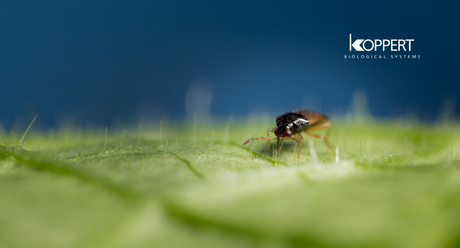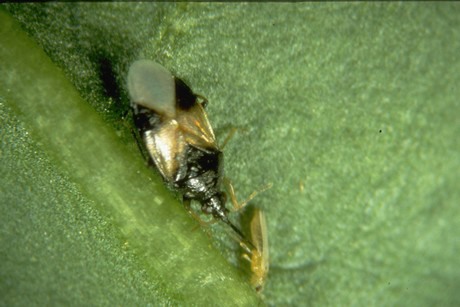The pest known as thrips (Frankiniella occidentalis) is becoming increasingly present in greenhouses in the winter. This is mainly due to the fact that the cold slows down the flowering of peppers. Due to the lack of flowers, there is not enough pollen to feed the Orius laevigatus (marketed by Koppert as THRIPOR-L®), which is the main natural enemy used for biological control against thrips.
When the Orius doesn't have pollen to feed, the energy it should use to lay eggs and reproduce is used to hunt thrips. As the chances for reproduction decline, the Orius populations tend to decrease and disappear after a while. If the appropriate measures are not taken, the conditions become ideal for the spread of thrips, since the pest is not threatened by any natural enemy capable of controlling it.

An adult Orius laevigatus on a pepper leaf
Combined use
To ensure an effective biological control of thrips, it is recommended to release some more Orius as reinforcement when the first flowers appear in the pepper plants. Another recommendation is to use reservoir plants, whose pollen complements that of the peppers, so that the Orius have enough food and their reproductive capacity is not reduced during the winter.
In addition, it is important to supplement this with the release of the predatory mite Neoseiulus cucumeris (marketed by Koppert as THRIPEX®). Koppert's technical team has confirmed the excellent results obtained with biological control in peppers with the combined use of THRIPOR-L® and THRIPEX®). It is also very useful to use the Macrocheles robustus predatory mite (marketed by Koppert as MACRO-MITE®), especially indicated against the pupae of thrips.

Orius capturing thrips
As a preventive measure, Koppert also recommends the placement of blue colored HORIVER® traps, which prevent the entry into the greenhouse of thrips from neighboring farms.
Lastly, it is worth bearing in mind that, to a greater or lesser extent, agrochemical treatments take a toll on the reproduction capacity of the Orius. For this reason, in the greenhouses where the crops are grown under organic farming standards, the Orius populations are always greater in winter, given the absence of the chemicals that are used in conventional agriculture. Therefore, it is advisable to avoid the accumulation of chemical treatments with different products so as not to disrupt the life cycle of the Orius.
Meet Koppert on the Fruit Logistica 2020 in Hall 3Stand 3D51
For more information:
Armando García, head of communications and marketing
KOPPERT ESPAÑA
C/ Cobre 22
Pol. Ind. Ciudad del Transporte del Poniente
La Mojonera, Almería. Spain
T: +34 950 55 44 64
F: +34 950 55 39 05
argarcia@koppert.es
www.koppert.es
